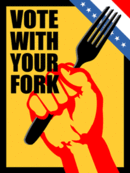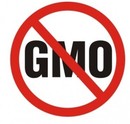Prop 37: We Are Not Defeated! Vote With Your Forks on GMOs!
While many of us are disappointed with the results of the CA proposition 37 ballot initiative, to say the least, the political process is so corrupted with unlimited corporate spending1 that the real surprise for me would have been if it had passed.
Whereas the two-party system enables corporations to equally fatten the campaign larders of both “flavors” of senator, or president – Coke or Pepsi; Democrat or Republican – ensuring that while the public thinks one side is the victor, they get their hooks in no matter who wins, the California ballot initiative was actually a grassroots effort where the only side being funded by the multi-national corporations was the one against the people’s right to know what’s in their food.
In other words, this was a unique opportunity for an increasingly co-opted and “entertainment value only” American political system to vindicate itself, showing that a legitimate basic human right (informed consent; the right to choose not to consume a potential toxins) could attain legal-regulatory support if enough folks voted for it.
Unfortunately, however, CA voters are highly susceptible to propaganda. The overwhelming majority support for Prop 37 eroded in the last few days before the vote. In essence, $48 million dollars of misleading media, advertising and even criminal misrepresentation of the truth, was enough to scare people into not doing what is so obviously required for there to be a semblance of food and health freedom in this country: the right to know what you are eating, and as a result, being able to choose to not eat something that is potentially toxic.
So, the truth and the people’s will can and will continue to be outspent… UNLESS, we decide to heighten our awareness of the issue (which the Yes to 37 campaign undoubtedly did, on an unprecedented, massive scale), and learn to take our daily food purchases as seriously as we do our vote…
Here are a few suggestions
- Do not buy anything that contains corn, soy, beet sugar, canola, cow’s dairy, papaya and is not explicitly labeled either “non-GMO” (in the case of milk “rBGH free”) or “USDA certified organic.”
- Avoid “natural brands” owned by pro-GMO mega-corporations, e.g. Heinz owns Spectrum Organics, M&M owns Seeds of Change, Hershey Foods owns Dagoba, Coca-Cola owns Odwalla.See entire list in the infographic here. Why not support these brands? Because even if you are buying one of their products containing an organic ingredient, the money goes to a corporation whose overall net effect is likely to expand non-organic practices versus organic ones. Or worse, the brands are simply labeled “natural” when they contain no organic ingredients, or even genetically modified ones.
- Avoid restaurant food whose ingredients are not clearly apparent. Have a discussion with the server and manager if necessary in order to express to them your desire to eat non-GMO foods. These efforts can go a long way in making a difference in the way they source and label foods in their menu.
Each and every purchasing decision you make today will have lasting effects tomorrow. Unlike plying massive efforts towards generating a majority vote on a ballot initiative, or getting our president to live up to his now failed GMO labeling campaign promises, the positive effect is immediate and will ripple out in ways that are deeper (even while being harder to directly measure) than simply changing labeling requirements.
So, given that the political process has put a stopper on much of the momentum behind the pro-labeling movement, send a message today by withdrawing your support (with your dollars, your forks, your mouths!) for the companies that do not support your right to know. Their bottom line is the only thing they will listen to.
Resources
- 1 DemocracyNow.org, Citizen’s United “opened the floodgates for unlimited corporate spending on election campaigns.”
![Food and Farming Resources image]() Food and Farming Resources
Food and Farming Resources
Find organic seeds, indoor growing systems, outdoor gardening tools and organic fish fertilizers in our Kindred Community Marketplace.
BOOKSTORE
Check out FCL’s Bookstore for Growing Your Own Food and Whole and Local Food Cookbooks.
SHOPPING GUIDES
Eat Well Guide
If you want good meat and don’t want the problems associated with industrially-raised factory meat, the Eat Well Guide is for you. This online resource lists farms and stores that sell sustainably-raised meat, including organic, antibiotic and hormone free, humanely raised, pasture raised and pasture raised. (Restaurants will be coming shortly.) This comprehensive guide covers all 50 states and Canada, and includes beef, pork, chicken, turkey, fish, lamb, goat, dairy and eggs. This is “the” resource for sustainably-raised meat.
Farmers Markets
Listing of farmers markets around the country. Includes a fact sheet about farmers markets and information about starting your own market. (From the USDA.)
Heritage Foods USA
Promotes genetic diversity, small family farms, and a fully traceable food supply. Committed to making wholesome, delicious and sustainably produced heritage foods available to all Americans. Current focus is on poultry. Fosters the link between sustainable land use, small-scale food production and preservation of the foods of past generations for future generations.
Local Harvest
A guide to online stores, farms, CSA, farmers markets and food co-ops selling all types of sustainably-raised food, including fruits and vegetables, nuts, grains, flowers and herbs. Also has an online store where you can buy products directly from family farms.
The Meatrix rBGH-free Dairy List
Search by state to find milk, butter, yogurt, ice cream and other dairy products that are rBGH-free. Mail order brands are included as well. We’ve also provided them as downloadable lists for your iPod to make shopping easier!
The National CSA Database
The Robyn Van En Center for CSA Resources provides a complete listing of CSAs throughout the US – just punch in your zip code to find a CSA near you!
Pastured Products Directory
State by state listing of pasture-raised animals, including cattle, pigs, poultry and rabbits. There is no independent certification, though producers have stated they follow the Eat Wild criteria, which limits antibiotics, excludes hormones and requires the animals be treated humanely and raised on pasture. (Eat Wild, produced by Jo Robinson)
Pesticides in Produce
A guide to 12 popular fresh fruits and vegetables that are consistently the most contaminated with pesticides and those 12 fruits and vegetables that consistently have low levels of pesticides. (Food News, from the Environmental Working Group)
Seafood Watch
Eating fish has become so confusing. Is it farmed, wild, endangered, or over fished? Are the fishing practices unsustainable? The Monterey Bay Aquarium’s Seafood Watch has information on all types of seafood. Includes a printable wallet card of which fish to buy, be concerned about, and avoid. Currently does not cover health issues surrounding fish. (Informational only – does not give actual places to buy fish.)
Seasense Database
Description of different types of fish followed by important points to be aware of when considering buying or serving it. Lists recommendations from other groups, including Monterey Bay Aquarium, NRDC, Blue Ocean Institute and Environmental Defense. Don’t forget to visit their Subscriber Database, a listing of ocean-friendly restaurants, fish markets and other businesses in some parts of the country. (Seafood Choices Alliance, a partnership of groups around the country working to save our oceans.)
Food and Water Watch’s Fish Guidelines
With 10 easy steps, FWW provides you with the most important things to remember when buying fish.
True Food Shopping List
Find out what foods contain genetically engineered ingredients. The True Food Shopping List contains hundreds of brand name products found in grocery stores around the country, listed into two columns — those that contain GE ingredients and those that don’t. The True Food Guide is a list of fruits and vegetables also separated into GE and non-GE. (True Food Network)
FOOD EDUCATIONAL ORGANIZATIONS AND NONPROFITS
Ecology Action and Grow Bionintensive. Since 1972 we and our colleagues have been researching and developing GROW BIOINTENSIVE®, a high-yielding, sustainable agricultural system that emphasizes local food production and is based historically on intensive gardening systems.
Food Not Lawns. Turning Yards into Gardens and Neighborhoods into Communities. Find or start a local chapter of Food Not Lawns (scroll to the bottom of the website for listings). Read the book.
Institute for Responsible Technology. The Institute for Responsible Technology is a world leader in educating policy makers and the public about genetically modified (GM) foods and crops. We investigate and report their risks and impact on health, environment, the economy, and agriculture, as well as the problems associated with current research, regulation, corporate practices, and reporting. Fantastic number of resources on this website to shop GMO-free, to become active in your community, and to take action on national and global GMO issues!
Local Harvest. The best organic food is what’s grown closest to you. Use our website to find farmers’ markets, family farms, and other sources of sustainably grown food in your area, where you can buy produce, grass-fed meats, and many other goodies. Want to support this great web site? Shop in our catalog for things you can’t find locally!
Organic Consumers Association. The Organic Consumers Association (OCA) is an online and grassroots non-profit 501(c)3 public interest organization campaigning for health, justice, and sustainability. The OCA deals with crucial issues of food safety, industrial agriculture, genetic engineering, children’s health, corporate accountability, Fair Trade, environmental sustainability and other key topics. We are the only organization in the US focused exclusively on promoting the views and interests of the nation’s estimated 50 million organic and socially responsible consumers.
Permaculture Institute. Permaculture is an ecological design system for sustainability in all aspects of human endeavor. It teaches us how build natural homes, grow our own food, restore diminished landscapes and ecosystems, catch rainwater, build communities and much more. The Permaculture Institute is an educational non-profit, offering Permaculture Design Courses and in-depth sustainable living classes.
Weston A. Price Foundation. The Weston A. Price Foundation is a nonprofit, tax-exempt charity founded in 1999 to disseminate the research of nutrition pioneer Dr. Weston Price, whose studies of isolated nonindustrialized peoples established the parameters of human health and determined the optimum characteristics of human diets. Dr. Price’s research demonstrated that humans achieve perfect physical form and perfect health generation after generation only when they consume nutrient-dense whole foods and the vital fat-soluble activators found exclusively in animal fats.
The Foundation is dedicated to restoring nutrient-dense foods to the human diet through education, research and activism. It supports a number of movements that contribute to this objective including accurate nutrition instruction, organic and biodynamic farming, pasture-feeding of livestock, community-supported farms, honest and informative labeling, prepared parenting and nurturing therapies. Specific goals include establishment of universal access to clean, certified raw milk and a ban on the use of soy formula for infants.



